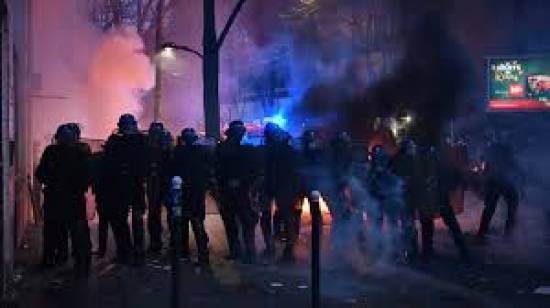Violence erupted in Paris on Saturday for the second consecutive weekend at a mass protest against a new security law, with demonstrators clashing with police, vehicles set alight and shop windows smashed.
The weekly nationwide protests are becoming a major headache for President Emmanuel Macron's government, with tensions intensified by the beating of a black music producer by police last month.
Members of the Yellow Vests movement, which shook Macron with protests against economic hardship in France over the winter of 2018-2019, were also prominent in the rally.
Windows of a supermarket, property agency and bank were broken while several cars burst into flames along Avenue Gambetta as demonstrators marched towards Place de la République in eastern Paris, AFP reporters said.
Objects were also thrown at police who responded by using tear gas, in a repeat of the violent scenes from the protests last weekend against the security law that would restrict publishing pictures of the faces of police.
Some demonstrators used objects left into the streets to create impromptu barricades that they then set on fire.
Protesters, some letting off smoke bombs and firecrackers, shouted slogans like "Everyone hates the police."
Interior Minister Gérald Darmanin wrote on Twitter that 22 people had been detained in Paris so far by police, who he said were facing "very violent individuals".
'No contradiction'
It was one of almost 100 protests planned throughout France on Saturday against the new security law with thousands gathering in cities including Marseille, Montpellier and Nantes, where two police officers were wounded by a Molotov cocktail.
Police had deployed in force to avert trouble after the violent clashes erupted during the demonstration in Paris a week ago that saw dozens wounded.
“The bill will not jeopardise in any way the rights of journalists or ordinary citizens to inform the public,” Alice Thourot, an MP for Macron’s La République En Marche (LREM) party and the co-author of the clause, told Le Figaro two weeks ago. Article 24 would “outlaw any calls for violence or reprisals against police officers on social media – and that only”, Thourot said.
Article 24 was intended in part to "allay justifiable fears among the police that they are being filmed on duty, identified on social media and endangered in their private lives, as the big platforms indulge subscribers in their favourite pastime: the trending vendetta", wrote Jeremy Harding, a frequent commentator on French politics, in the London Review of Books.
But journalists' groups and human rights organisations have led protests for weeks to have the government scrap or revise the bill, saying it would make it harder to prosecute cases of abuse. "We're heading towards an increasingly significant limitation of freedoms," Karine Shebabo, a protester at Saturday's demonstration in Paris, told Reuters.
After four French police officers were charged November 30 over the beating and racial abuse of black music producer Michel Zecler, MPs from Macron's party pledged a "complete rewrite" of part of the draft law.
Under a sign demanding the withdrawal of the security law, CGT union leader Philippe Martinez said several causes were coming together.
"There is no contradiction between public and individual freedoms and the need to fight job insecurity and unemployment," Martinez told AFP.
He referred to the "abuse of employers" and the loss of worker protections.
Not 'reducing freedoms'
The new clashes came after Macron gave hugely-anticipated interview on Friday to Brut, a video-based news portal aimed at young people. Voters aged 18-24 are the age group among which the president is the most popular, according a survey by Odoxa for Le Figaro and France Info published on Friday.
Macron acknowledged "there are police who are violent" and insisted that "they need to be punished".
He acknowledged that "when you have a skin colour that is not white, you are controlled much more (by police). You are identified as a problem factor. And that cannot be justified."
But he also lashed out at the violence against police at last weekend's rally in Paris, which he blamed on "crazy people".
"I cannot let it be said that we are reducing freedoms in France," he said.


